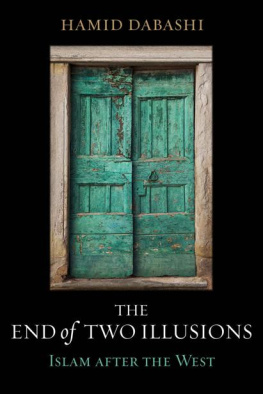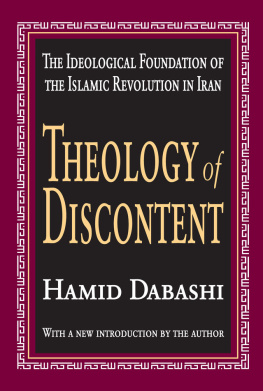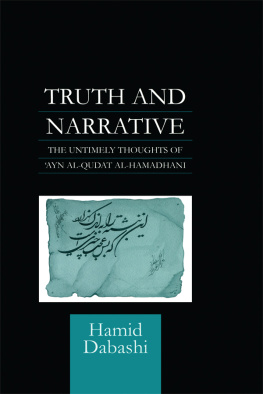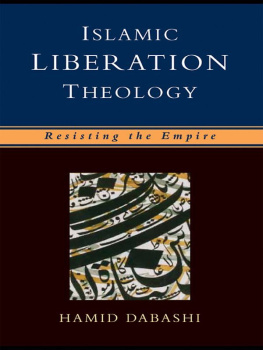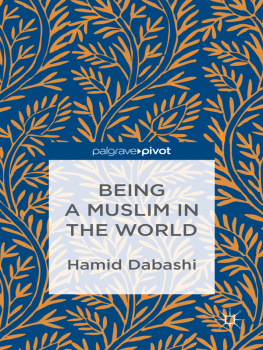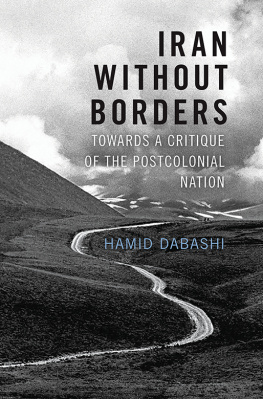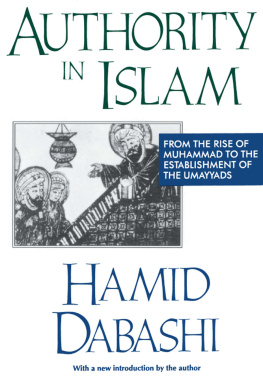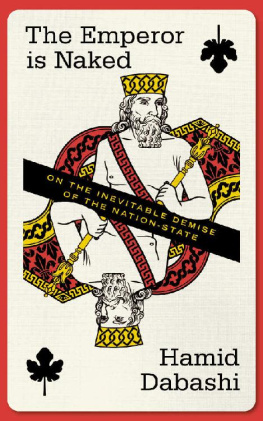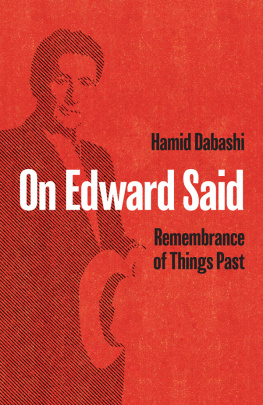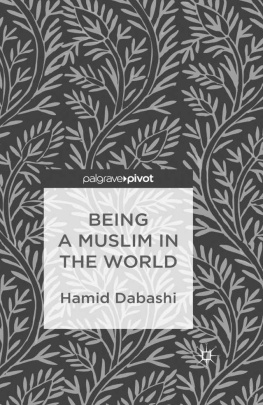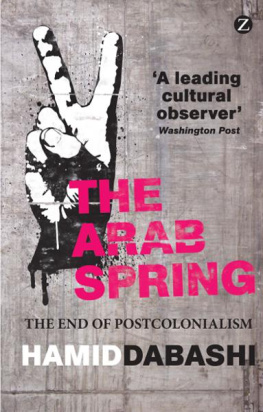Hamid Dabashi - The End of Two Illusions
Here you can read online Hamid Dabashi - The End of Two Illusions full text of the book (entire story) in english for free. Download pdf and epub, get meaning, cover and reviews about this ebook. year: 2022, publisher: University of California Press, genre: Religion. Description of the work, (preface) as well as reviews are available. Best literature library LitArk.com created for fans of good reading and offers a wide selection of genres:
Romance novel
Science fiction
Adventure
Detective
Science
History
Home and family
Prose
Art
Politics
Computer
Non-fiction
Religion
Business
Children
Humor
Choose a favorite category and find really read worthwhile books. Enjoy immersion in the world of imagination, feel the emotions of the characters or learn something new for yourself, make an fascinating discovery.
- Book:The End of Two Illusions
- Author:
- Publisher:University of California Press
- Genre:
- Year:2022
- Rating:3 / 5
- Favourites:Add to favourites
- Your mark:
- 60
- 1
- 2
- 3
- 4
- 5
The End of Two Illusions: summary, description and annotation
We offer to read an annotation, description, summary or preface (depends on what the author of the book "The End of Two Illusions" wrote himself). If you haven't found the necessary information about the book — write in the comments, we will try to find it.
The End of Two Illusions — read online for free the complete book (whole text) full work
Below is the text of the book, divided by pages. System saving the place of the last page read, allows you to conveniently read the book "The End of Two Illusions" online for free, without having to search again every time where you left off. Put a bookmark, and you can go to the page where you finished reading at any time.
Font size:
Interval:
Bookmark:
PRAISE FOR THE END OF TWO ILLUSIONS
This book should have been written a long time ago. It is the first bold and incisive deconstruction of the greatest fabricated binary of this century: Islam and the West. This old Orientalist and destructive juxtaposition has survived until today and provided the moral justification for the brutal American assaults on Afghanistan and Iraq. This book offers a different genealogy for the emergence of this constructed binary, positioned one against the other in a poisonous, and artificial, relationship. Hamid Dabashi forcefully challenges this dangerous concept of Islam and the West, offering an alternative de-racialized and humane perspectivevisions of the past and future that will be essential for all who are embroiled and affected by this insidious and violent construct. Scholars and the wider audience will find in this book an accessible, honest, and very readable critique of a notion that impacts the lives of so many of us in this century.
ILAN PAPP , Professor of History and Director of the European Centre for Palestine Studies, University of Exeter
Islam and the West is a gnoseological invention (not a representation) cast in the binary logic undergirding the idea of Western Civilization. Dabashis convincing and powerful argument is the call to extricate ourselves from this and all binary illusions that shatter thinking in order to manage subjective and intersubjective relations.
WALTER D. MIGNOLO , author of The Politics of Decolonial Investigations
Dabashi, with all the erudition of a distinguished scholar, takes on and demolishes a fiction that has long been accepted as truth: that something called the West and Islam actually exist. This book both pushes back against mainstream and right-wing authors and takes on scholarly work that falls into the trap of creating an essentialized West. It then draws on millennia of history to expose the limitations of the Islam and the West framework. This brilliant book is an important intervention at this historical moment when the empire of capital has assumed new forms to legitimate itself.
DEEPA KUMAR , Professor of Media Studies at Rutgers University and author of Islamophobia and the Politics of Empire: 20 Years after 9/11
Hamid Dabashi

UNIVERSITY OF CALIFORNIA PRESS
University of California Press
Oakland, California
2022 by Hamid Dabashi
Library of Congress Cataloging-in-Publication Data
Names: Dabashi, Hamid, 1951 author.
Title: The end of two illusions : Islam after the West / Hamid Dabashi.
Description: Oakland, California : University of California Press, [2022] | Includes bibliographical references and index.
Identifiers: LCCN 2021046891 (print) | LCCN 2021046892 (ebook) | ISBN 9780520376922 (cloth) | ISBN 9780520376939 (paperback) | ISBN 9780520976320 (epub)
Subjects: LCSH: IslamHistory. | Islam and world politics. | East and West.
Classification: LCC DS 37.7 . D 33 2022 (print) | LCC DS 37.7 (ebook) | DDC 297.2/72dc23/eng/20211104
LC record available at https://lccn.loc.gov/2021046891
LC ebook record available at https://lccn.loc.gov/2021046892
31 30 29 28 27 26 25 24 23 22
10 9 8 7 6 5 4 3 2 1
For YASIR SULEIMAN
In Friendship and with Gratitude
Mirror, Mirror on the wall, whos the fairest of them all?
SNOW WHITE AND THE SEVEN DWARFS (1937)
I
II
III
This book has been in the making for quite a long time. At least since the events of 9/11 in 2001 I have been thinking, reading, and writing on the subject matter of this book. But even before 9/11 I cannot even remember a time when this bizarre binary opposition presumed between Islam and the West had not given me an occasion to pause and wonder. Islam is a religion, of which I have been a student all my adult life; the West is a geographical designation, where I have lived and studied and taught for much of my adult life. How could these two entities, apples and oranges, as it were, be placed next to each other? Their transfigurations into two allegorical designations are precisely where my thinking began to take shape. The writing of this book is the final result of that thinking.
Naomi Schneider, executive editor at University of California Press, has been instrumental in seeing this book to fruition. Without her enduring commitment, professional steadfastness, and sustained encouragements, I would have been lost in the labyrinth of thinking this book through. Two anonymous reviewers have taken time to offer me detailed and constructive comments on an earlier draft. I am grateful to them. My research assistant, Toga Mohamed Badran, has been definitive to my research with her uncanny ability to locate obscure books and articles for me. She has a magic touch in her inroads into the back alleys of the internet.
Gil Hochberg, the chair of my department at Columbia, has been graciously accommodating with my writing habits. She is a blessing as our fearless leader! Joseph Massad is my closest friend, colleague, and interlocutor on the Columbia campus. His proximity and friendship to me is the last solace after we both lost Edward Said and Magda al-Nowaihi. Massads exquisite text, Islam in Liberalism (2017), has been as crucial for my deliberations in this book as Edward Saids iconic Orientalism (1978). Their pioneering work forms the premises of my own.
My young colleague at Barnard College, Atefeh Akbari Shahmirzadi, has been a source of kindness and reassurances at these dire times. I cherish her friendship. Over the last few years, I have been increasingly blessed with the friendship of my other distinguished colleague, Ali Mirsepassi. I treasure his friendship and wise counsel. Mahmoud Omidsalar is the singular source of my peace of mind and scholarly confidence. He and I come from a deep tradition of textual hermeneutics that has very few traces left on North American campuses. Even when I am not texting or calling him to chat about sources, I am talking to him in my mind about critical editions. I deeply admire him and am blessed with his enduring friendship. Ismail Nashef, the distinguished Palestinian scholar of social sciences and humanities, has been another consistent source of inspiration for me. The bold, bright, and magnificent Ramin Bahrani, the dazzling filmmaker of uncommon brilliance, who began as my student and emerged as a dear close friend, adds a daily dose of grace and care in my life. Because of the COVID pandemic and other pressing conditions of our lives, I do not see these friends as much as I wish. But they are the shining stars sparkling in my darkest nights.
Abr-o Bad-o Mah-o Khorshid-o Falak (the Cloud, the Wind, the Moon, the Sun, and the Firmament), as the inimitable Sadi says in a poem, have been at work to enable me to sit and bask in moments of peace and write this book. Thank you, friends!
Hamid Dabashi
New York
Spring 2021
A whole world riding upon an illusion
Upon an illusion their war and their peace,
Upon an illusion their pride and their shame
RUMI , Masnavi (12581273)
In mid-November 2019, as the prospect of an impeachment inquiry was haunting Donald Trumps presidency, of which he was later acquitted in the US Senate, yet another scandalous story broke out. The Southern Poverty Law Center, a highly reliable and widely respected civil rights and anti-racist stronghold, broke the news that Stephen Miller, a Trump White House speechwriter and trusted adviser to the US president, had been the author of hundreds of emails to the editors of
Next pageFont size:
Interval:
Bookmark:
Similar books «The End of Two Illusions»
Look at similar books to The End of Two Illusions. We have selected literature similar in name and meaning in the hope of providing readers with more options to find new, interesting, not yet read works.
Discussion, reviews of the book The End of Two Illusions and just readers' own opinions. Leave your comments, write what you think about the work, its meaning or the main characters. Specify what exactly you liked and what you didn't like, and why you think so.

